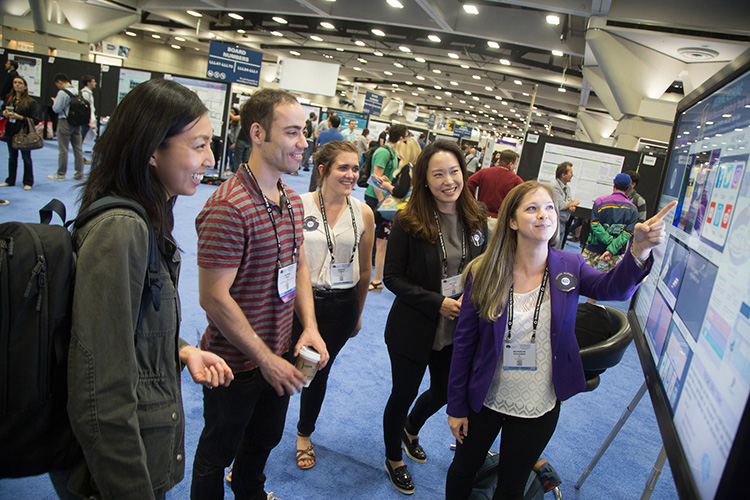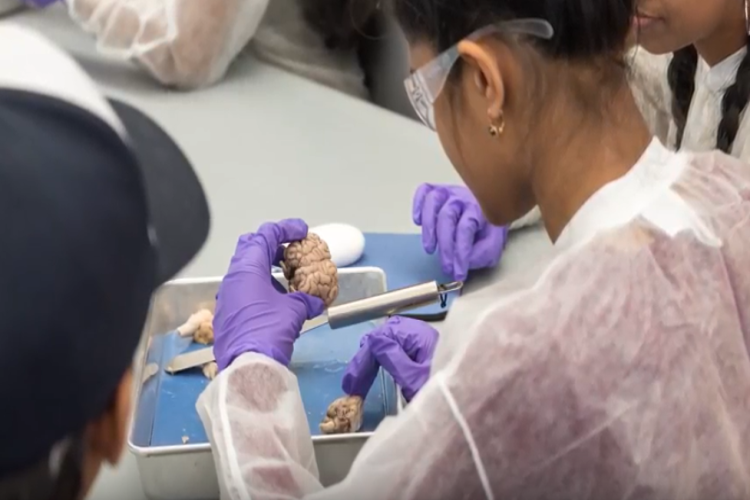
Neuroscience Advocates Make Strong Case With Lawmakers for Research Funding
During SfN’s 12th annual Capitol Hill Day, advocates representing 25 states and six countries held 93 Congressional meetings — an SfN record — to ask policymakers to support robust and predictable increases in biomedical research funding. Advocates were well-received by all congressional offices, demonstrating that federal investment in biomedical research continues to be a bipartisan priority.
2018 Early Career Policy Ambassadors
Catherine Braine, Columbia University
Irene Cheng, University of Virginia
Oluwarotimi Folorunso, The University of Texas Medical Branch
Joyonna Gamble-George, University of Florida
Julia Gerson, University of Michigan
Joe Luchsinger, Vanderbilt University
Sasha Luks-Morgan, University of Utah
Chanel Matney, Johns Hopkins University
Michael Nestor, Hussman Institute for Autism
Misha Raffiee, Stanford University
Casey Roark, Carnegie Mellon University
Jennifer Tribble, UCLA
Ensuring that policymakers understand that funding scientific research creates high-quality jobs and opportunities for discovery in their district has yielded significant victories, including an additional $3 billion in NIH funding for FY2018; NSF saw an increase of $295 million.
Addressing Hill Day participants, SfN President Richard Huganir reminded advocates to seize the opportunity to continue to show members of Congress the immense value of investment in neuroscience research. “Your participation is crucial in advancing the interest of neuroscience, and who better to explain the importance of neuroscience than those of us who are engaged in research every day?” Huganir said.
Huganir also honored Rep. Tom Cole (R-OK) and Sen. Roy Blunt (R-MO), who were both on hand to accept SfN’s 2017 Public Advocacy Award, given to leaders dedicated to advancing biomedical research. In presenting the award, Huganir thanked the lawmakers for their tireless efforts to champion funding for NIH and added, “This is an award we don’t give out every year, but today we have two outstanding recipients.”
Joining the ranks of dedicated advocacy leaders, the newly selected class of Early Career Policy Ambassadors (ECPAs) kicked off their full-year program at Hill Day. As this was their first major assignment, and many had never been to Capitol Hill, the ambassadors were eager to speak with policymakers.
Taking Your Advocacy to the Next Level
Register Now:
June 1: Measuring Advocacy Outcomes
Watch Now:
Inspiring Others to Be Science Advocates
Leveraging Public Opinion in Support of Science
Strategies to Maximize Your Advocacy Results
“Our government is run by people with interests in science, empathy, and a genuine desire to help their constituents,” said Jennifer Tribble, a PhD candidate at the University of California, Los Angeles, and an ECPA. Advocates can leverage this interest to increase funding for biomedical research.
“At Hill Day, I emphasized how continued and increased funding at the federal level for biomedical research projects can not only save lives through scientific discoveries but stimulate the U.S. economy,” said Joyonna Gamble-George, a postdoctoral fellow at the University of Florida and an ECPA.
While this year’s funding increase for research represents an impressive victory, funding levels for FY2019 are currently being negotiated, and neuroscientists must continue to press their members of Congress.
To make the greatest impact, SfN members can schedule in-person meetings and lab tours to build relationships with policymakers and their staff. Insiders on Capitol Hill emphasize the need for human connection during these interactions. Uncovering a specific connection with an office and developing lasting relationships will help advocates to influence policy decisions.
During a Hill Day panel in which Congressional staff spoke to participating SfN members about advocacy strategies, a member of the health policy staff of Sen. Bob Menendez (D-NJ) reminded advocates to connect with policymakers through story sharing. Because time is limited, advocates should prioritize making a connection back to the state or district, and can follow up with more detailed information after the meeting.
Hill staff also reinforce that advocates should highlight the most pressing concerns in a way that is relatable and helps them to share the human story beyond the numbers, which are important to know, with their boss.
Advocates can prepare for their interactions with members of Congress by watching SfN’s four-part webinar series created in partnership with Research!America.
To stay informed of the latest opportunities, sign up for the Advocacy Network Newsletter. Interested advocates can contact advocacy@sfn.org for more information.
























